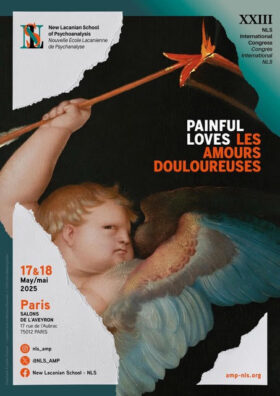The 23rd Congress of the New Lacanian School is dedicated to Painful Loves. It will explore the intricate relationship between love and suffering as testified by centuries of literature and poetry, but also by the subjectivity of the time. Modern technologies, the politicization of the intimate, the pervasiveness of a discourse which interprets the sexual non-rapport in terms of the master-slave relationship, self-love, the rise of the signifier ‘control’ bring new challenges to love. How does psychoanalysis respond and what can it offer in civilization? Freud invented a new type of Other to whom love can be addressed, as J.-A. Miller puts it: “a new Other who gives new responses to love, perhaps more adequate than those found in everyday life”. During the clinical sessions, we will be able to hear how the analytic discourse succeeds in catching the drama of love in the net of signifiers, or even in squeezing it into a well-saying. We will be sensitive to the way in which the practitioners operate in order to obtain the change of the problem to a subjective question.
Presentation of the 2025 NLS Congress Theme
by Patricia Bosquin-Caroz
The title, “Painful Loves,” [“Les amours douloureuses”] is one consonant with unhappy loves
[“Les amours malheureuse”]. It evokes the dramatic, even tragic, dimension of love, or of
loves. As for the word “painful,” it suggests a tone of excess in the pain experienced. Some
affects, such as sadness, are a sign of malaise, while others, such as anxiety, imply the crossing
of unbearable limits. Freud placed the tension between the pleasure principle and the beyond
of the pleasure principle at the heart of the problem of mental suffering. Lacan, for his part,
highlighted a strange satisfaction, a mixture of pleasure and pain, which he called jouissance.
An entire literature, to which Roland Barthes refers in his essay, “A Lover’s Discourse:
Fragments,” focuses on the pangs of love, lovesickness examined in a variety of forms:
expectation, asceticism, ravishment, compassion, dependence, exile, errancy, jealousy and so
on. More recently, the title of Sophie Calle’s work on love bereavement, Exquisite Pain, also
resonates as a paradoxical satisfaction.
Drawing on different approaches to love in Lacan’s teaching, not without Freud’s contributions,
we in turn will explore the mainsprings of painful loves. Read more.
Présentation du thème du Congrès NLS 2025
par Patricia Bosquin-Caroz
Le titre, « Les amours douloureuses », consonne avec les amours
malheureuses. Il évoque la dimension dramatique, voire tragique de l’amour
ou des amours. Le terme « douloureux », lui, laisse entendre une tonalité
d’excès dans la peine éprouvée. Ainsi, certains affects, comme la tristesse,
font signe d’un mal-être, d’autres, comme l’angoisse, connotent un
franchissement de la limite du supportable. Freud a placé au centre de la
problématique de la souffrance psychique la tension entre principe de plaisir
et au-delà du principe de plaisir. Lacan, quant à lui, a mis en lumière une
étrange satisfaction, mixte de plaisir et de douleur, qu’il a désignée sous le
vocable de jouissance. Toute une littérature, à laquelle Roland Barthes se
réfère dans son essai Fragments d’un discours amoureux, fait fond sur les
douleurs d’amour ; le mal d’amour se déclinant en une variété de
manifestations : l’attente, l’ascèse, le ravissement, la compassion, la
dépendance, l’exil, l’errance, la jalousie etc. Plus récemment, le titre de
l’œuvre de Sophie Calle sur le deuil amoureux, Douleur exquise, fait aussi
résonner une satisfaction paradoxale.
À partir de différentes approches de l’amour dans l’enseignement de Lacan,
non sans les apports de Freud, à notre tour nous explorerons les ressorts des
amours douloureuses. Lire la suite.

